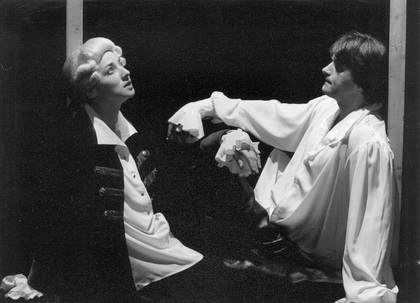
The Adventure Marina TsvetaevaReminiscing about the birth of this production, the actors say: “Just imagine, the economy was in shambles: the stores were empty; we were constantly hungry; we rehearsed at nights to the sound of our growling stomachs. But it was so wonderful to be engaged with something so far away from all of that…” Everyone can tell a few stories about that period of their life, and gradually overlapping, they become legends. Right away, The Adventure caught the eye of international producers, and Tsvetaeva’s characters went on an exciting tour: France, Italy, Switzerland, Brazil, Germany, Macedonia, Belgium… And all around the world, the stage hands would erect, just for a few nights, an exact copy of the corridor, whose blackness once gave birth to the production.
Opening night: October 29, 1991 Running time: 50 minutes without intermission |
| Director | Ivan Popovski | |
| Designer | Olga-Maria Tumakova (Moscow King's Theater), Sergei Bartoshevich | |
| Composer | Yelena Mogilevskaya | |
| Characters and Cast: | ||
| Giacomo Casanova sharp angle and coal | Andrei Kazakov | |
| Henri-Henriette lunar ice | Galina Tyunina | |
| Captain war dog | Oleg Lyubimov | |
| Girl all of youth, all of Italy | Madlen Dzhabrailova | |
| Le Duc contemporary and associate of Casanova | Karen Badalov | |
| Hunchback like all hunchbacks | Yury Stepanov | |
| Celloist vine | Igor Ovchinnikov | |
| Pedant a charming mess | Rustem Yuskaev | |
| French Ambassador | Tagir Rakhimov | |
| Spanish Ambassador | Karen Badalov | |
| 1st Spaniard | Sergei Yakubenko | |
| 2nd Spaniard | Kirill Pirogov, Everett Christopher Dixon | |
| 1st Frenchman | Sergei Yakubenko | |
| 2nd Frenchman | Kirill Pirogov, Everett Christopher Dixon | |
| 1st seamstress at the boutique | Ksenia Kutepova | |
| 2nd seamstress at the boutique | Polina Kutepova | |
 |
©
Viktor Bazhenov |
| © 1996—2026 «Pyotr Fomenko Workshop Theatre» fomenko@theatre.ru Boxoffice: +7 (499) 249-19-21 (from 12:00 to 21:00, without a break) Information about tickets: +7 (499) 249-17-40 (we work weekdays from 12:00 to 20:00) Fax: +7 (495) 645-33-13 Address: 121165 Moscow, Kutuzovsky prospect, 30/32 |